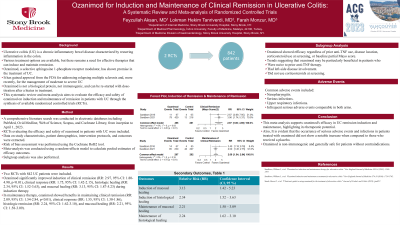Monday Poster Session
Category: IBD
P2114 - Ozanimod for Induction and Maintenance of Remission in Ulcerative Colitis: A Systematic Review and Meta-analysis of Randomized Controlled Trials
Monday, October 23, 2023
10:30 AM - 4:15 PM PT
Location: Exhibit Hall

Has Audio
- FA
Feyzullah Aksan, MD
Stony Brook University Hospital
Stony Brook, NY
Presenting Author(s)
Feyzullah Aksan, MD1, Lokman Hekim Tanriverdi, PhD, MD2, Farah Monzur, MD, FACG1
1Stony Brook University Hospital, Stony Brook, NY; 2Inonu University School of Medicine, Malatya, Malatya, Turkey
Introduction: Ulcerative colitis (UC) is a chronic inflammatory bowel disease characterized by recurring inflammation in the colon. Various treatment options are available, but there remains a need for effective therapies that can induce and maintain remission. Ozanimod, a selective sphingosine 1-phosphate receptor modulator, has shown promise in the treatment of UC. This meta-analysis aims to evaluate the effect of ozanimod on induction and maintenance of remission in patients with UC through available randomized controlled trials (RCTs).
Methods: A comprehensive literature search was conducted in electronic databases including PubMed, Ovid Medline, Web of Science, Scopus, and Cochrane Library, from inception to April 1, 2023. RCTs evaluating the efficacy and safety of ozanimod in patients with UC were included. Data on study characteristics, patient demographics, intervention protocols, and outcomes were extracted. Risk of bias assessment was performed using the Cochrane RoB2 tool. Meta-analysis was conducted using a random-effects model to calculate pooled estimates of efficacy outcomes. Subgroup analysis was also performed.
Results: Two RCTs with 842 UC patients were included. Ozanimod significantly improved clinical remission (RR: 2.97, 95% CI: 1.80-4.90, p< 0.01), clinical response (RR: 1.75, 95% CI: 1.42-2.15), histologic healing (RR: 2.34, 95% CI: 1.52-3.63), and mucosal healing (RR: 3.13, 95% CI: 1.87-5.23) during induction therapy.
In maintenance therapy, ozanimod showed benefits in maintaining clinical remission (RR: 2.09, 95% CI: 1.54-2.84, p< 0.01), clinical response (RR: 1.55, 95% CI: 1.30-1.86), histologic remission (RR: 2.24, 95% CI: 1.62-3.10), and mucosal healing (RR: 2.21, 95% CI: 1.58-3.09).
Subgroup analysis confirmed ozanimod's efficacy regardless of prior anti-TNF use, disease location, corticosteroid use at screening, or baseline partial Mayo score. However, there were trends suggesting that ozanimod may be particularly beneficial in patients who were naive to prior anti-TNF therapy, had left side disease involvement, or did not use corticosteroids at screening.
Common adverse events included nasopharyngitis, serious infections, and upper respiratory infections. Infrequent serious adverse events were comparable in both arms.
Discussion: This meta-analysis supports ozanimod's efficacy and safety in UC remission induction and maintenance, highlighting its therapeutic potential. Further large-scale RCTs are needed for confirmation and expansion of these findings.

Disclosures:
Feyzullah Aksan, MD1, Lokman Hekim Tanriverdi, PhD, MD2, Farah Monzur, MD, FACG1. P2114 - Ozanimod for Induction and Maintenance of Remission in Ulcerative Colitis: A Systematic Review and Meta-analysis of Randomized Controlled Trials, ACG 2023 Annual Scientific Meeting Abstracts. Vancouver, BC, Canada: American College of Gastroenterology.
1Stony Brook University Hospital, Stony Brook, NY; 2Inonu University School of Medicine, Malatya, Malatya, Turkey
Introduction: Ulcerative colitis (UC) is a chronic inflammatory bowel disease characterized by recurring inflammation in the colon. Various treatment options are available, but there remains a need for effective therapies that can induce and maintain remission. Ozanimod, a selective sphingosine 1-phosphate receptor modulator, has shown promise in the treatment of UC. This meta-analysis aims to evaluate the effect of ozanimod on induction and maintenance of remission in patients with UC through available randomized controlled trials (RCTs).
Methods: A comprehensive literature search was conducted in electronic databases including PubMed, Ovid Medline, Web of Science, Scopus, and Cochrane Library, from inception to April 1, 2023. RCTs evaluating the efficacy and safety of ozanimod in patients with UC were included. Data on study characteristics, patient demographics, intervention protocols, and outcomes were extracted. Risk of bias assessment was performed using the Cochrane RoB2 tool. Meta-analysis was conducted using a random-effects model to calculate pooled estimates of efficacy outcomes. Subgroup analysis was also performed.
Results: Two RCTs with 842 UC patients were included. Ozanimod significantly improved clinical remission (RR: 2.97, 95% CI: 1.80-4.90, p< 0.01), clinical response (RR: 1.75, 95% CI: 1.42-2.15), histologic healing (RR: 2.34, 95% CI: 1.52-3.63), and mucosal healing (RR: 3.13, 95% CI: 1.87-5.23) during induction therapy.
In maintenance therapy, ozanimod showed benefits in maintaining clinical remission (RR: 2.09, 95% CI: 1.54-2.84, p< 0.01), clinical response (RR: 1.55, 95% CI: 1.30-1.86), histologic remission (RR: 2.24, 95% CI: 1.62-3.10), and mucosal healing (RR: 2.21, 95% CI: 1.58-3.09).
Subgroup analysis confirmed ozanimod's efficacy regardless of prior anti-TNF use, disease location, corticosteroid use at screening, or baseline partial Mayo score. However, there were trends suggesting that ozanimod may be particularly beneficial in patients who were naive to prior anti-TNF therapy, had left side disease involvement, or did not use corticosteroids at screening.
Common adverse events included nasopharyngitis, serious infections, and upper respiratory infections. Infrequent serious adverse events were comparable in both arms.
Discussion: This meta-analysis supports ozanimod's efficacy and safety in UC remission induction and maintenance, highlighting its therapeutic potential. Further large-scale RCTs are needed for confirmation and expansion of these findings.

Figure: Figure 1,Effect of Ozanimod on Induction of Clinical Remission by Subgroup Analysis
Disclosures:
Feyzullah Aksan indicated no relevant financial relationships.
Lokman Hekim Tanriverdi indicated no relevant financial relationships.
Farah Monzur: Medtronic (Covidien) – Consultant.
Feyzullah Aksan, MD1, Lokman Hekim Tanriverdi, PhD, MD2, Farah Monzur, MD, FACG1. P2114 - Ozanimod for Induction and Maintenance of Remission in Ulcerative Colitis: A Systematic Review and Meta-analysis of Randomized Controlled Trials, ACG 2023 Annual Scientific Meeting Abstracts. Vancouver, BC, Canada: American College of Gastroenterology.
